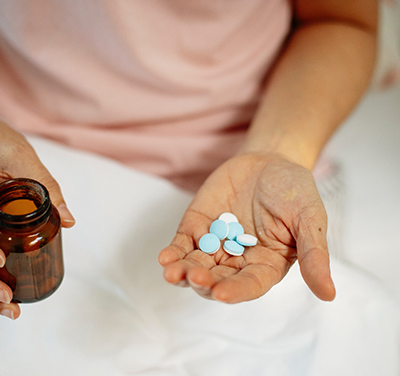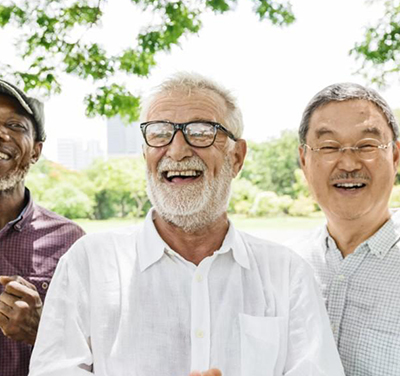Depression
Older adults face many life changes and these life changes could lead to clinical depression in predisposed vulnerable elderly individuals:
- Retirement
- The death of friends and loved ones
- Increased isolation
- Medical problems
If left untreated, depression not only affects mood but also physical health, impaired memory, concentration and enjoyment of life.
Depression is not a normal part of aging and there are many remedies to overcome the symptoms, irrespective of age or the life’s challenges. The brain continues to change throughout life, so it’s never too late to make positive changes and enjoy the golden years.
Depression
A problem for many older adults and the elderly:
- “Have you lost interest in the activities you used to enjoy”?
- Do you struggle with feelings of helplessness and hopelessness?
- Are you finding it harder and harder to get through the day?
Depression is a common problem in older adults. The symptoms of depression affect every aspect of life, including energy, appetite, sleep and interest in work, hobbies and relationships.
Unfortunately, all too many depressed seniors fail to recognize the symptoms of depression, or don’t take the steps to get the help they need. There are many reasons for depression in older adults and the elderly which are often overlooked:
- Assume to have good reason to be down or that depression is just part of aging.
- Isolation could lead to depression
- Few around the elderly to notice the distress.
- Do not realize that physical complaints are signs of depression.
- Reluctant to talk about feelings or ask for help.
Feeling good as you age:
- Depression is not a sign of weakness or a character flaw
- Could happen to anyone, at any age
- Does not depend on background or previous accomplishments in life.
- Physical illness, loss, and the challenges of aging don’t have to keep the elderly down.
- Senior depression could be treated with the right support, treatment, and self-help strategies to feel better and live a happy and vibrant life.
Causes of depression in older adults and the elderly
- Health problems: – Illness and disability; chronic or severe pain; cognitive decline; damage to body image due to surgery or disease.
- Loneliness and isolation – Living alone; a dwindling social circle due to deaths or relocation; decreased mobility due to illness or loss of driving privileges.
- Reduced sense of purpose – Feelings of purposelessness or loss of identity due to retirement or physical limitations on activities.
- Fears – Fear of death or dying; anxiety over financial problems or health issues.
- Recent bereavement – The death of friends, family members, and pets; the loss of a spouse or partner.
Bereavement, loss, and depression in the elderly
- Bereavement, loss, and depression in the elderly
- Elderly experience many losses
- Loss is painful
- Loss of independence, mobility, health, long-time career, spouse or loved ones
- Grieving over losses is normal and healthy, even if it last for a long time.
- Losing all hope and joy, however, is uncommon.
Is it grief or depression?
- Grief and clinical depression share many symptoms
- There are ways to tell the difference.
- Grief is a roller coaster with wide variety of emotions and a mix of good and bad days. In the middle of the grieving process there will be moments of pleasure or happiness.
- Depression will have the constant feelings of emptiness and despair present
Symptoms that suggest depression, not just grief:
- Intense pervasive sense of guilt
- Thoughts of suicide or
Preoccupation with dying
- Feeling of hopelessness
Helplessness and worthlessness
- Slow speech and body movements
- Inability to function (work/home)
- Hearing/or seeing things that are not present
Depression and Illness in Elderly
- Often linked to physical illness
- Linked to chronic pain and physical disability
- Could be a part of medical problems such as dementia
- Side effect of prescription drugs.
Could Medical conditions cause depression in the elderly?
Medical problems could cause depression in older adults and the elderly (either directly or as a psychological reaction to the illness). Any chronic medical condition, particularly if it is painful, disabling, or life-threatening, can lead to depression or make depression symptoms worse.
Could Prescription medications cause depression in the elderly?

Symptoms of depression could be:
- Side effect of many commonly prescribed drugs.
- At risk because of multiple medications.
- Older adults are more sensitive because aging bodies become less efficient at metabolizing and processing drugs.
Medications that can cause or worsen depression include:
- Blood pressure medication (clonidine), Reserpine, Beta-blockers (e.g. Lopressor, Inderal)
- Sleeping pills
- ranquilizers (e.g. Valium, Xanax, Halcion)
- Calcium-channel blockers (Procardia, Adalat)
- Medication for Parkinson’s disease
- Ulcer medication (e.g. Zantac, Tagamet)
- Steroids (e.g. cortisone and prednisone)
- High-cholesterol drugs (e.g. Lipitor, Mevacor, Zocor)
- Painkillers and arthritis drugs
- Estrogens (e.g. Premarin, Prempro)
Alcohol and depression in the elderly:
FACTS About Alcohol use in elderly:
- To deal with physical and emotional pain
- Takes mind off an illness or feel less lonely
- Drink at night to get sleep.
- Feels better in the short term
- Cause problems over time.
- Make symptoms of depression worse and impairs brain function.
- Interacts in negative ways with numerous medications
- Impairs the quality of sleep.
What is the manifestation of depression in the elderly?
- Sadness
- Fatigue
- Abandoning or losing interest in hobbies or other pleasurable pastimes
- Social withdrawal and isolation (reluctance to be with friends, engage in activities, or leave home)
- Weight loss or loss of appetite
- Sleep disturbances (difficulty falling asleep or staying asleep, oversleeping, or daytime sleepiness)
- Loss of self-worth (worries about being a burden, feelings of worthlessness, self-loathing)
- Increased use of alcohol or other drugs
- Fixation on death; suicidal thoughts or attempts
Does Depression manifest in the elderly without sadness?
- Many depressed seniors claim not to feel sad at all.
- Complain of low motivation
- Lack of energy
- Physical problems such as arthritis pain or worsening headaches are often the predominant symptom of depression in the elderly.
What are the Depression clues in older adults?
- Unexplained or aggravated aches and pains
- Feelings of hopelessness or helplessness
- Anxiety and worries
- Memory problems
- Lack of motivation and energy
- Slowed movement and speech
- Irritability
- Loss of interest in socializing and hobbies
- Neglecting personal care (skipping meals, forgetting meds, neglecting personal hygiene)
Dementia vs. depression in the elderly
Loss of mental sharpness is not just a normal sign of old age. It could be a sign of either depression or dementia, both of which are common in older adults and the elderly.
COPING WITH DEPRESSION:
- Exercise. Physical activity has powerful mood-boosting effects. In fact, research suggests it may be just as effective as antidepressants in relieving depression. The best part is that the benefits come without side effects.
- Connect with others. Getting support plays a big role in lifting the fog of depression and keeping it away. May not feel like reaching out, but make an effort to connect to others and limit the time alone. If you cannot get out for socializing, invite loved ones to visit or keep in touch over the phone or email.
- Bring your life into balance. If overwhelmed by stress and the pressures of daily life, it may be time to learn new emotional management and emotional intelligence skills.
- Get enough sleep. Aim for somewhere between 7 to 9 hours of sleep each night.
- Maintain a healthy diet. Avoid eating too much sugar and junk food. Choose healthy foods that provide nourishment and energy.
- Participate in activities. Pursue whatever hobbies or pastimes that bring or used to bring pleasure.
- Volunteer your time. Helping others is one of the best ways to feel better and expand social network.
- Take care of a pet. A pet can keep you company, and walking a dog, for example, can be good exercise and a great way to meet people.
- Learn a new skill. Pick something that you always wanted to learn, or that sparks imagination and creativity.
- Create opportunities to laugh. Laughter provides a mood boost, so swap humorous stories and jokes with loved ones, watch a comedy, or read a funny book.
1. Look for small ways to add more movement.
2. Park farther from the store
3. Take the stairs
4. Do light housework
5. Enjoy a short walk.
6. Even if you are ill, frail, or disabled, there are many safe exercises to build strength and boost mood even from a chair or wheelchair
Depression treatment options for older adults and the elderly
Healing after bereavement and loss
After a significant loss
- Elderly may experience all kinds of difficult and surprising emotions, such as shock, anger, and guilt.
- These feelings can be frightening and overwhelming
- Accept them as part of the grieving process for healing.
Treatment of Depression is just as effective for elderly adults as it is for younger people.
- Depression in older adults and the elderly is often the result of a difficult life situation or challenge. Any treatment plan should address that issue.
- Loneliness is at the root of depression
- Medication alone is not going to cure the problem.
- Any medical issues complicating the depression should be addressed.
Older adults are more sensitive to drug side effects and vulnerable to interactions with other medicines
Antidepressant treatment for older adults and the elderly
Selective serotonin-reuptake inhibitors (SSRI)





Special dietary instructions While on MAOI/
Should not take Foods that are high in Tyramine while on MAOI’s
1. Meat (especially cured meat)
2. Poultry (Chicken Liver)
3. Fish
4. Aged cheese
5. Certain fruits, vegetables, beans, Avocados
6. Alcoholic beverages (Red Wine)
7. Yeast products that have fermented
These foods could elevate blood pressure to dangerous levels resulting in Cardiovascular and cerebrovascular complications. Ask the doctor or dietitian if you have any questions about what you may eat and drink during your treatment.
Does Counseling and therapy help older adults and the elderly?
Therapy works well on depression because it addresses the underlying causes of the depression, rather than just the symptoms.
- Supportive counseling
- Therapy
- Support groups
Religious and peer counseling
1. Ease loneliness and the hopelessness
2. Help to find new meaning and purpose.
a) Helps to work through stressful life changes
b) Heal from losses
c) Process difficult emotions
d) Help to change negative thinking patterns
e) Develop better coping skills.
1. Connect with others who are going through the same challenges
2. These are safe places to share experiences, advice, and encouragement.
Dealing with Depression in the Elderly
One cannot beat depression through sheer willpower, but do have some control—even if depression is severe and stubbornly persistent. The very nature of depression interferes with a person’s ability to seek help, draining energy and self-esteem. For depressed seniors, raised in a time when mental illness was highly stigmatized and misunderstood, it can be even more difficult—especially if one do not believe depression is a real illness, are too proud or ashamed to ask for assistance, or fear becoming a burden to their families.
If an elderly person is depressed
- Offer emotional support.
- Listen with patience and compassion.
- Do not criticize feelings expressed
- Point out realities
- Offer hope.
- Help to get an accurate diagnosis and appropriate treatment
- Help to find a good doctor
- Accompany him or her to appointments
- Offer moral support.
Other tips for helping a depressed elderly friend or relative:
- Invite your loved one out
- Schedule regular social activities
- Plan and prepare healthy meals.
- Encourage the person to follow through with treatment
- Make sure all medications are taken as instructed
1. Suggest activities to do together
2. Walks, an art class, a trip to the museum or the movies
1. Group outings
2. Visits from friends and family members
3. Trips to the local senior or community center can help combat isolation and loneliness
1. Plenty of fruit
2. Vegetables
3. Whole grains
4. Some protein at every meal.
1. Depression usually recurs when treatment is stopped too soon
2. Help to keep up with his or her treatment plan.
3. If it is not helping
4. Look into other medications and therapies.
1. Remind to follow doctor’s orders about the use of alcohol
2. Help to remember when to take their dose.
Watch for suicide warning signs
- Collecting or buying pills
- Getting a gun
- Giving valuables away
- Writing a suicide note
Seek immediate professional help if the elderly is thinking about suicide.
Location
New Hope Clinical Research
3101 Latrobe Dr
Charlotte, NC 28211
Fax : 980-226-5843
Email : contact@newhcr.com
Office Hours
- Monday – 8:00 am – 5:00 pm
- Tuesday – 8:00 am – 5:00 pm
- Wednesday – 8:00 am – 5:00 pm
- Thursday – 8:00 am – 5:00 pm
- Friday – 8:00 am – 5:00 pm
- Saturday – Closed
- Sunday – Closed








